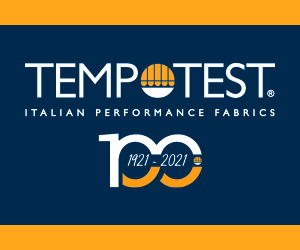Rockland Mills Expands Factory, Testing, Innovation
March 24, 2014
BALTIMORE, Maryland—Rockland Mills, Inc., the makers of Roc-Lon® drapery lining is undergoing a major expansion from 250,000 to 300,000 square feet in Bamberg, S.C. to accommodate its wide width, 140 inch ranges of blackout drapery linings.
As part of the expansion, Rockland is pre-testing all products in-house to make sure they pass all flammability tests in the EC according to Stan Fradin, President.
Fradin recently announced his retirement but indicates he will stay connected in some meaningful capacity with Rockland. He says that Rockland has had a long history in the blackout lining business. The company was founded in 1832 but it has been under the same family since 1947, The Lederman Family. Zandy Lederman, the founder who passed some years ago, discovered a way to replace vinyl backing in drapery lining in 1967so the product could be washed or dry cleaned in residential or contract applications. In the mid 90’s, Rockland introduced solid color linings instead of just white and ivory. “We still keep our technology close to ourselves because we are not interested in training foreign manufacturers in making our products,” Fradin says. “Ours is a highly automated manufacturing process—not a sewing operation.”
As textile manufacturing slowly comes back to the USA, Fradin feels that many producers will look to Rockland to coat textile products in its Bamberg plant. We’re opening up other opportunities for manufacturers and converters who want to export by offering our coating services. “There have been too many accidents in Bangladesh and India. Suppliers will turn to the States in the future,” he feels. “Quality is the nature of our business.”  “Roc-Rol”tm Roller Shade Fabric
“Roc-Rol”tm Roller Shade Fabric
“We pack every roll of goods in a special box to eliminate crushing,” says Darren Fradin, Vice President. We have brought more innovation to the market in the last eight years than we have in the past 40,” he maintains. “Every major workroom in the U.S. is now using wide-width blackout drapery lining from Rockland. Everything is now wide because it saves fabrication and installation cost,” Fradin says.
Rockland works with polyester, poly/cotton and poly flax base fabrics in 300 yard rolls ready for printing. “The customer can provide their own designs or use our archives,” Stan points out.
Roller shade fabric from Rockland is now a major new product opportunity for the company. “It is designed front and back. It is an extra wide textile product—not PVC. It is a sandwich with a decorative front and back. The designs can be different on each side,” Stan says.
One piece blackout is also offered with a printed face inside the hotel room and an energy saving foam back which saves heating and cooling costs. It’s especially popular in the Middle East hospitality arena,” Stan says.
“We have also gone to the expense to install testing equipment in our Bamberg, S.C. plant to make sure our improved, state of the art products pass all FR tests in Europe before they are actually tested in the field,” he says. “Of course, Roc-Lon passes the California flammability standard NFPA 701. When’s the last time you’ve heard about a hotel fire in the USA?” he asks. “Our products are self extinguishing in the presence of a flame—not fireproof. Our products are fire retardant.”
He points out that Rockland is the last of its kind in the USA. “We foam, coat and produce drapery linings six days a week. Who else is better equipped to design and test drapery linings than Rockland? We pass the Boston and California tests and are on the cutting edge of innovation. I challenge off shore products from Asia to beat Rockland. Imported products have to prove they are safe. Theirs are made with chemicals which are not always safe.”
“Roc-Lon has changed its formulation to pass all tests effective January 1 as per the U.S. Environmental Protection Agency. Fradin points to his business with Valley Forge and Marriott International in illustrating the acceptance of Roc-Lon in the USA. “The use of new chemicals opens up new doors for Roc-Lon in the export market,” Fradin maintains. The quality of our components is safe according to current U.S. standards.”
“We will continue to test imported products to make sure they are safe in terms of formaldehyde levels and other standards,” he says. “The imported products are not always 100 percent blackout and there is sometimes a problem with delamination of those products after dry-cleaning.” Fradin says that often, levels of chemicals in imported blackout are not correctly formulated.
“You as the purchaser are now liable for any problems with those imported products in the field. Roc-Lon is chemically marked so if there is a problem we can determine if it is out product or not. Most of the time, when there are problems, it is not our goods but an import that fails.”
















